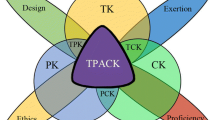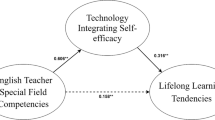Abstract
The aim of this study is to examine the relationship between the candidate’s lifelong learning key competences and educational technology standards self-efficacy. Relational scanning model was used in the study. The sample of the study consists of 594 teacher candidates enrolled in the pedagogical formation course of the Faculty of Education of Fırat University. In order to collect data, the “Lifelong Learning Key Competences Scale” developed by Şahin, Akbaşlı and Yanpar-Yelken (2010) and “Competences Scale for Educational Technology Standards” developed by Çoklar (2008) were used. Diagnostic analysis, t-test, MWU and Pearson Correlation analysis were benefited from for data analysis. According to the analyzes, it was determined that teacher candidates participated in lifelong learning key competencies in upper intermediate level in dimensions other than “communication in foreign language competence” sub-dimension. Significant results were found in favor of female candidates in terms of the “competence of communication in the mother tongue”, “competency to learn learning”, “competency of social citizenship awareness” and according to the gender variable across the scale. It is determined that teacher candidates have high level of educational technology standards self-efficacy. A significant difference in favor of female candidates was observed according to the gender variable “technological processes and concepts knowledge”, and according to gender” learning environments and planning and designing of learning experiences” sub-dimensions. It was figured out that teacher candidates had moderate level positive relationships between the key competences of lifelong learning and the educational technology standards self-efficacy sub-dimensions. In the light of the results of the research, it has been recommended some suggestions.

Similar content being viewed by others
Explore related subjects
Discover the latest articles, news and stories from top researchers in related subjects.References
Adabaş, A. (2016). Bartın Üniversitesi lisansüstü eğitim öğrencilerinin yaşam boyu öğrenmede anahtar yeterliklere sahip olma düzeyleri. Bartın: Yayınlanmamış yüksek lisans tezi, Bartın Üniversitesi.
Akkoyunlu, B. (2008). Bilgi okuryazarlığı ve yaşam boyu öğrenme. In International educational technology conference (IECT) (Davetli konuşmacı). Eskişehir: Anadolu Üniversitesi.
Arsal, Z. (2011). Lifelong learnıng tendencies of the prospective teachers in the Bologna process in Turkey. In ATTE annual conference 2011: Teachers’ life-cycle from initial teacher education to experienced professional (pp. 496–509). Riga: Latvia University.
Aspin, D. N., & Chapman, J. D. (2000). Lifelong learning: Concepts and conceptions. International Journal of Lifelong Education, 19(1), 2–19.
Avrupa Komisyonu. (2005). Proposal for a recommendation of the European Parliament and of the Councıl on key competences for lifelong learning. adresinden alınmıştır 21 Mar 2013 tarihinde http://eurlex.europa.eu/LexUriServ/LexUriServ.do?uri=COM:2005:0548:FIN:EN:PDF.
Babanlı, N. (2018). Yetişkin eğitimindeki kursiyerlerin yaşam boyu öğrenme yeterlikleri (Yüksek lisans tezi, İstanbul Aydın Üniversitesi ve Yıldız Teknik Üniversitesi Sosyal Bilimler Enstitüleri).
Brooks, R. (2006). Young graduates and lifelong learning: The ımpact of ınstitutional stratification. Sociology, 40(6), 1019–1037.
Budak, Y. (2009). Yaşam boyu öğrenme ve ilköğretim programlarının hedeflemesi gereken insan tipi. Gazi Eğitim Fakültesi Dergisi, 29(3), 693–708.
Büyüköztürk, Ş. (2010). Sosyal Bilimler İçin Veri Analizi El Kitabı. Ankara: Pegem Akademi.
Büyüköztürk, Ş., Kılıç, E. K., Akgün, Ö. E., Karadeniz, Ş. & Demirel, F. (2009). Bilimsel Araştırma Yöntemleri (4. Basım). Ankara: Pegem A Yayıncılık.
Candy, P. C. (1994). Lifelong learning and information literacy. Report for U.S. National Commision on Libraries and Information Science and National Forum on Information Literacy.
Çepni, S. (2007). Araştırma ve Proje Çalışmalarına Giriş (Geliştirilmiş 3. Baskı). Trabzon: Celepler Matbaacılık.
Çoklar, A. N. (2008). Öğretmen adaylarının eğitim teknolojisi standartları ile ilgili özyeterliklerinin belirlenmesi (Doktora Tezi, Anadolu Üniversitesi, Eğitim Bilimleri Enstitüsü, Eskişehir).
Coşkun, Y. D., & Demirel, M. (2012). Üniversite öğrencilerinin yaşam boyu öğrenme eğilimleri. Hacettepe Üniversitesi Eğitim Fakültesi Dergisi (H.U. Journal of Education), 42, 108–120.
Demirel, M., & Akkoyunlu, B. (2010). Öğretmen adaylarının yaşam boyu öğrenme eğilimleri ve bilgi okuryazarlığı özyeterlik algıları. In 10th international educational technology conference (pp. 1126–1133). İstanbul: Boğaziçi Üniversitesi.
Demirel, M., & Yağcı, E. (2012). Sınıf öğretmeni adaylarının yaşam boyu öğrenmeye ilişkin algıları. Hacettepe Üniversitesi Eğitim Fakültesi Dergisi (H.U. Journal of Education) Özel Sayı, 1, 100–111.
Diker Coşkun, Y. (2009). Üniversite öğrencilerinin yaşam boyu öğrenme becerilerinin bazı değişkenler açısından incelenmesi. Yayınlanmamış doktora tezi. Ankara: Hacettepe Üniversitesi Sosyal Bilimler Enstitüsü.
Dündar, H. (2016). Sınıf öğretmeni adaylarının yaşam boyu öğrenme eğilimlerinin incelenmesi. Yayınlanmamış yüksek lisans tezi. Erzurum: Atatürk Üniversitesi Eğitim Bilimleri Enstitüsü.
Fan, R. J. D., & Tan, P. J. B. (2019). Application of ınformation technology in preschool aesthetic teaching from the perspective of sustainable management. Sustainability, 11, 2179.
Garipagaoglu, B. C. (2013). The effect of self-efficacy on the lifelong learning tendencies of computer education and instructional technologies pre-service teachers: A case study. International Journal of Human Sciences, 10(1), 224–236.
Gencel, İ. E. (2013). Öğretmen adaylarının yaşam boyu öğrenme yeterliklerine yönelik algıları. Eğitim ve Bilim., 38(170), 237–252.
Günüç, S., Odabaşı, H. F., & Kuzu, A. (2012). Yaşam boyu öğrenmeyi etkileyen faktörler (factors affecting lifelong learning). Gaziantep Üniversitesi Sosyal Bilimler Dergisi, 11(2), 309–325 ISSN:1303–0094.
Gürbüz, S., & Şahin, F. (2018). Sosyal Bilimlerde Araştırma Yöntemleri. Ankara: Seçkin Yayıncılık.
Gürol, A., Yavuzalp, N., Bağçacı, F., & Serhatlıoğlu, B. (2009). Öğretmen adaylarına göre eğitim fakültelerinde eğitim teknolojisi standartları ve performans göstergelerinin uygulanma durumu (Fırat Üniversitesi Örneği). In 9th international educational technology conference, Ankara (6–8 Mayıs).
İpek, C., & Acuner, H. Y. (2011). Sınıf öğretmeni adaylarının bilgisayar öz-yeterlik inançları ve eğitim teknolojilerine yönelik tutumları. Ahi Evran Üniversitesi Eğitim Fakültesi Dergisi, 12((2) Haziran Özel Sayı), 23–40.
İşman, A. (2002). Sakarya ili öğretmenlerinin eğitim teknolojileri yönündeki yeterlilikleri. The Turkish Online Journal of Educational Technology – TOJET, 1(1, 10), 72–91.
ISTE. (2000). ISTE national educational technology standards (NETS) and performance indicators for teachers. http://www.iste.org/docs/pdfs/nets_for_teachers_2000.pdf?sfvrsn=2. adresinden 21 Apr 2017 tarihinde edinilmiştir.
ISTE (International Society for Technology in Education). (2017). About ISTE. https://www.iste.org/about-iste. adresinden 01 May 2017 tarihinde edinilmiştir.
İzci, E., & Koç, S. (2012). Öğretmen adaylarının yaşam boyu öğrenmeye ilişkin görüşlerinin değerlendirilmesi. Adıyaman Üniversitesi Sosyal Bilimler Enstitüsü Dergisi, 5(9), 101–114.
Jenkins, A. (2004). Women, lifelong learning and employment, CEEDP, 39. Centre for the Economics of Education. London: School of Economics and Political Science.
Karasar, N. (2011). Bilimsel Araştırma Yöntemi. Ankara: Nobel Yayın Dağıtım.
Kılıç, Ç. (2014). Öğretmen adaylarının yaşam boyu öğrenmeye yönelik algıları. Eğitim ve Öğretim Araştırmaları Dergisi, 3(4), 79–87.
Köksal, N., & Çöğmen, S. (2013). Pre-service teachers as lifelong learners: University facilities for promoting their professional development. Egitim Arastirmalari-Eurasian Journal of Educational Research, 53, 21–40.
Makhabbat, A., & Çoklar, A. N. (2018). Öğretmen adaylarının eğitim teknolojisi standartlarına yönelik özyeterliklerinin belirlenmesi. Uluslararası Eğitim Bilimleri Dergisi, 5(15), 141–153.
Mesleki Eğitim ve Öğretim Sisteminin Güçlendirilmesi Projesi MEGEP. (2007). Hayat Boyu Öğrenme Strateji Belgesi (TASLAK): Ankara. http://www.megep.meb.gov.tr/megep/genel/hayatboyu/. Erişim 05 June 2015.
Milli Eğitim Bakanlığı. (2009). Hayat Boyu Öğrenme Strateji Belgesi. Ankara. Retrieved from http://ecvet.ua.gov.tr/Uploads/f7699346-4182-4730-8282-a61938751493.pdf. Accessed 15 August 2019
Orhan, D., Kurt, A. A., Ozan, Ş., Som Vural, S., & Turkan, F. (2014). A holistic view to national educational technology standards. Karaelmas Journal of Educational Sciences, 2, 65–79.
Özçiftçi, M. (2014). Sınıf öğretmenlerinin yaşam boyu öğrenme eğilimleri ile eğitim teknolojisi standartlarına yönelik özyeterliklerinin ilişkisi. Yayınlanmamış yüksek lisans tezi. Amasya Üniversitesi Sosyal Bilimler Enstitüsü.
Özçiftçi, M., & Çakır, R. (2015). Öğretmenlerin yaşam boyu öğrenme eğilimleri ve eğitim teknolojisi standartları özyeterliklerinin incelenmesi. Eğitim Teknolojisi Kuram ve Uygulama, 5(1), 1–19.
Özgür, H. (2016). Öğretmen adaylarının yaşam boyu öğrenme yeterlikleri ve bilgi okuryazarlığı öz-yeterlikleri üzerine bir çalışma. Mersin Üniversitesi Eğitim Fakültesi Dergisi, 12(1), 22–38.
Pınarcık, Ö., Özözen Danacı, M., Deniz, M. E., & Eran, N. (2016). Okul öncesi öğretmenlerinin yaşam boyu öğrenme yeterliklerine yönelik algıları. Abant İzzet Baysal Üniversitesi Eğitim Fakültesi Dergisi, 16(4), 1966–1983.
Rausch, A. S. (2003). A case study of lifelong learning in Japan: Objectives, curriculum, accountability, and visibility. International Journal of Lifelong Education., 22(5), 518–532.
Şahin, Ç., & Arcagök, S. (2014). Öğretmenlerin yaşam boyu öğrenme yeterlikleri düzeyinin çeşitli değişkenler açısından incelenmesi. Adıyaman Üniversitesi Sosyal Bilimler Enstitüsü Dergisi, 7(16), 394–417.
Şahin, M., Akbaşlı, S., & Yanpar Yelken, T. (2010). Key competences for lifelong learning: The case of prospective teachers. Educational Research and Review, 5(10), 545–556.
Şimşek, A., Özdamar, N., Uysal, Ö., Kobak, K., Berk, C., & Kılıçer, T. (2009). İki binli yıllarda Türkiye’deki eğitim teknolojisi araştırmalarında gözlenen eğilimler. Kuram ve Uygulamada Eğitim Bilimleri, 9(2), 941–966.
Smarkola, C. (2008). Efficacy of planner behavior model: Beliefs that contribute to computer usage intentions of student teachers and experienced teachers. Computers in Human Behaviour, 24, 1196–1215.
Tan, P. J. B. (2015). English e-learning in the virtual classroom and the factors that influence ESL (English as a second language): Taiwanese citizens’ acceptance and use of the modular object-oriented dynamic learning environment. Social Science Information, 54(2), 211–228.
Tan, P. J. B. (2019). An empirical study of how the learning attitudes of college students toward English e-tutoring websites affect site sustainability. Sustainability, 11(6), 1748.
Tan, P. J. B., & Hsu, M. H. (2017a). Developing a system for English evaluation and teaching devices. In Proceedings of the 2017 international conference on applied system innovation (ICASI), Sapporo, Japan, 13–17 May 2017 (pp. 938–941).
Tan, P. J. B. & Hsu, M. H. (2017b). Understanding the needs and criteria of employees in the electronics industry for English e-learning website programmes. In 2017 international conference on industrial informatics & computational intelligence, Cambodia.
Tan, P. J. B., & Hsu, M. H. (2018). Designing a system for English evaluation and teaching devices: A PZB and TAM model analysis. EURASIA Journal of Mathematics, Science and Technology Education, 14(6), 2107–2119.
Ulaş, A. H., & Ozan, C. (2010). Sınıf öğretmenlerinin eğitim teknolojileri açısından yeterlilik düzeyi. Atatürk Üniversitesi, Sosyal Bilimler Enstitüsü Dergisi, 14(1), 63–84.
Ulucan, H., & Karabulut, E. O. (2012). Beden eğitimi öğretmen adaylarının eğitim teknolojisi standartları ile ilgili özyeterliklerinin incelenmesi. Selçuk Üniversitesi Beden Eğitimi ve Spor Bilim Dergisi, 14(2), 243–248.
Usta, E., & Korkmaz, Ö. (2010). Öğretmen adaylarının bilgisayar yeterlikleri ve teknoloji kullanımına ilişkin algıları ile öğretmenlik mesleğine yönelik tutumları. Uluslararası İnsan Bilimleri Dergisi, 7(1), 1335–1349.
Yaman, F. (2014). Öğretmenlerin yaşam boyu öğrenme eğilimlerinin incelenmesi (Diyarbakır ili örneği). Yayınlanmamış yüksek lisans tezi. Diyarbakır: Dicle Üniversitesi Eğitim Bilimleri Enstitüsü.
Yavuz Konokman, G., & Yanpar Yelken, T. (2014). Eğitim fakültesi öğretim elemanlarının yaşam boyu öğrenme yeterliklerine ilişkin algıları. Hacettepe Üniversitesi Eğitim Fakültesi Dergisi, 29(2), 267–281.
Yıldırım, Z. (2015). Sınıf öğretmenlerin yaşam boyu öğrenmeye yönelik yeterlik algıları ve görüşleri. Yayınlanmamış yüksek lisans tezi. Çanakkale Onsekiz Mart Üniversitesi Eğitim Bilimleri Enstitüsü.
Author information
Authors and Affiliations
Corresponding author
Additional information
Publisher’s note
Springer Nature remains neutral with regard to jurisdictional claims in published maps and institutional affiliations.
This study is an extended version of the papers presented at the 1st International Symposium of Turks of Social Sciences (2017) and 11th International Instructional Computer & Instructional Technologies Symposium (2017).
Rights and permissions
About this article
Cite this article
Kan, A.Ü., Murat, A. Examining the self-efficacy of teacher candidates’ lifelong learning key competences and educational technology standards. Educ Inf Technol 25, 707–724 (2020). https://doi.org/10.1007/s10639-019-10072-8
Received:
Accepted:
Published:
Issue Date:
DOI: https://doi.org/10.1007/s10639-019-10072-8




